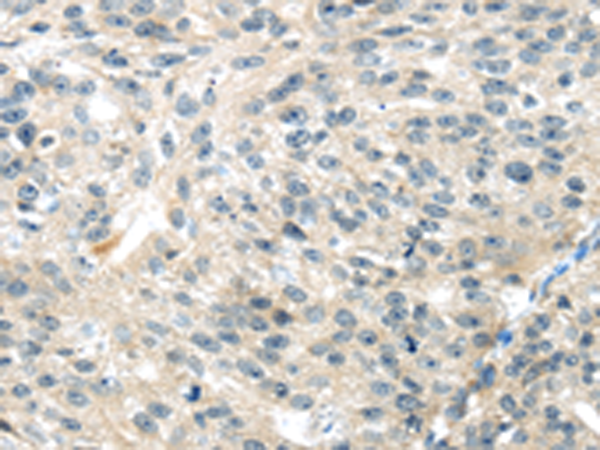

| WB | 咨询技术 | Human,Mouse,Rat |
| IF | 咨询技术 | Human,Mouse,Rat |
| IHC | 1/30-1/150 | Human,Mouse,Rat |
| ICC | 技术咨询 | Human,Mouse,Rat |
| FCM | 咨询技术 | Human,Mouse,Rat |
| Elisa | 1/2000-1/10000 | Human,Mouse,Rat |
| Aliases | TRIP; RNF206 |
| Host/Isotype | Rabbit IgG |
| Antibody Type | Primary antibody |
| Storage | Store at 4°C short term. Aliquot and store at -20°C long term. Avoid freeze/thaw cycles. |
| Species Reactivity | Human |
| Immunogen | Fusion protein of human TRAIP |
| Formulation | Purified antibody in PBS with 0.05% sodium azide and 50% glycerol. |
+ +
以下是3条关于TRAIP抗体的参考文献及其摘要概括:
---
1. **"TRAIP promotes DNA damage response during genome replication and is antagonized by germline disease mutations"**
*Authors: Harley et al.*
摘要:研究通过开发特异性TRAIP抗体,验证了TRAIP蛋白在DNA复制应激中的关键作用,揭示其通过调控复制叉稳定性参与DNA损伤修复,并发现遗传突变导致抗体检测的TRAIP功能缺失与疾病相关。
2. **"TRAIP is a master regulator of DNA interstrand crosslink repair"**
*Authors: Wu et al.*
摘要:利用TRAIP单克隆抗体进行免疫沉淀和活细胞成像,证明TRAIP在DNA链间交联修复中协调FANCI/D2复合体的激活,抗体阻断实验进一步支持其作为治疗相关癌症靶点的潜力。
3. **"Development of a novel monoclonal antibody against TRAIP for immunohistochemical analysis in glioblastoma"**
*Authors: Sato et al.*
摘要:报道一种新型抗TRAIP单克隆抗体的开发,通过免疫组化证实其在胶质母细胞瘤中高表达,且抗体特异性验证显示与患者预后不良显著相关,提示其作为诊断标志物的价值。
---
以上文献均聚焦TRAIP抗体的实验应用(如功能研究、诊断开发),涉及DNA修复机制及临床关联分析。如需扩展,可进一步检索近年关于TRAIP抗体在泛素化调控或 CRISPR 筛选中的研究。
TRAIP (TRAF-interacting protein) is a conserved eukaryotic protein involved in genome stability, DNA repair, and cell cycle regulation. Initially identified through its interaction with TNF receptor-associated factors (TRAFs), TRAIP functions as an E3 ubiquitin ligase, playing critical roles in replication stress response, ribosome biogenesis, and mitotic progression. Structurally, it contains a RING domain for ubiquitination activity, coiled-coil regions for protein interactions, and a nucleolar localization signal.
TRAIP is essential for resolving stalled replication forks by promoting the removal of replication barriers and activating the ATR/CHK1 checkpoint. It also participates in 5S rRNA processing and ribosome assembly. Mutations in TRAIP are linked to human diseases, including 3M syndrome (characterized by growth retardation) and microcephalic primordial dwarfism. In cancer, TRAIP dysregulation correlates with genomic instability and tumor progression, making it a potential therapeutic target.
Antibodies targeting TRAIP are vital tools for studying its expression, localization, and molecular interactions. They are used in techniques like Western blotting, immunofluorescence, and immunoprecipitation to explore TRAIP’s roles in DNA damage response, cell cycle checkpoints, and disease mechanisms. These antibodies also aid in identifying TRAIP-associated pathways in cancer models and developmental disorders, providing insights into its dual functions in homeostasis and disease.
×